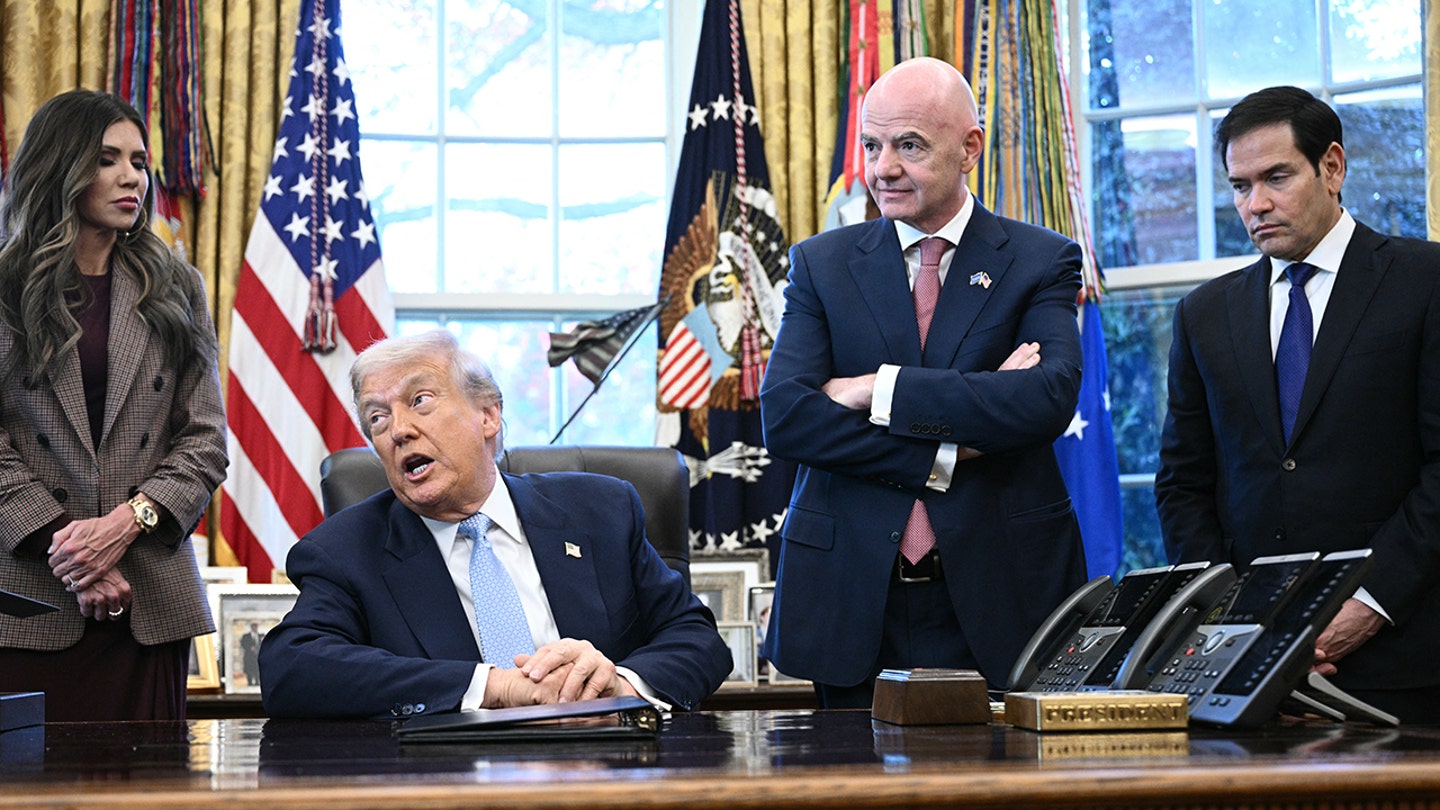
US prepares for influx of international visitors ahead of World Cup with security at the forefront
Entities mentioned:
- United States: Pride, Security, Recognition
- President Donald Trump: Ambition, Legacy, Control
- State Department: Duty, Security, Professional pride
- Matt Pierce: Professional pride, Duty, Enthusiasm
- Marco Rubio: Duty, Professional pride, Security
- FIFA: Ambition, Recognition, Legacy
Article Assessment:
Credibility Score: 75/100
Bias Rating: 65/100 (Lean Right)
Sentiment Score: 75/100
Authoritarianism Risk: 55/100 (Mixed/Neutral)
Bias Analysis:
The article leans right, focusing heavily on Trump administration initiatives and quoting only Republican officials. It presents a positive view of increased security measures without exploring potential downsides.
Key metric: International Tourism Revenue
Let me tell you something, folks - this is the ULTIMATE PREGAME SHOW for Team USA! The 2026 World Cup is like our country's Super Bowl, and President Trump is playing 4D chess to make sure we DOMINATE on and off the field. We're talking about a FULL COURT PRESS on security and hospitality! The State Department is running a FULL-THROTTLE OFFENSE with this 'FIFA Pass' play, aiming to CRUSH those visa wait times like a linebacker demolishing a quarterback. But make no mistake, they're playing LOCKDOWN DEFENSE too, vetting visitors with the intensity of a championship team studying game film. This is America's chance to flex its HOSTING MUSCLES and show the world we've got the STAMINA, the STRATEGY, and the STAR POWER to put on the greatest show on earth! I'm telling you right now, this is going to be a SLAM DUNK for U.S. tourism and our global reputation. It's GAME TIME, America!

2026 World Cup Host Countries, Cities, Stadiums
Entities mentioned:
- FIFA: Ambition, Legacy, Influence
- United States: Pride, Competitive spirit, Recognition
- Canada: Pride, Recognition, Competitive spirit
- Mexico: Pride, Recognition, Competitive spirit
- FOX Sports: Competitive spirit, Ambition, Professional pride
Article Assessment:
Credibility Score: 85/100
Bias Rating: 50/100 (Center)
Sentiment Score: 75/100
Authoritarianism Risk: 20/100 (Strongly Democratic)
Bias Analysis:
The article presents factual information about the 2026 World Cup hosting arrangements without favoring any particular country or perspective. The focus is on providing details about the event rather than promoting a specific viewpoint.
Key metric: International Sports Prestige
Let me tell you something, folks - this is the BIGGEST PLAY in World Cup history! We're talking a TRIPLE THREAT match with the USA, Canada, and Mexico forming an ALL-STAR TEAM to host this global championship! It's like combining the offensive firepower of three powerhouse franchises to create an UNSTOPPABLE FORCE in the sports world. The United States is stepping up to the plate in a major way, hosting a whopping 78 games across 11 cities - that's clutch performance right there! Canada and Mexico are bringing their A-game too, each contributing 13 matches in their home stadiums. This isn't just a game, folks - it's a continent-wide sports SPECTACULAR that's going to rewrite the record books! With 48 teams battling it out across 104 matches, we're looking at a marathon of soccer that'll test the endurance and strategy of every single player and coach involved. It's fourth quarter, championship-level intensity from day one, and I'm telling you right now, this is going to be one for the ages!

2026 World Cup Draw: How to Watch? How Does It Work? What Are Pots?
Entities mentioned:
- FIFA: Control, Influence, Legacy
- United States: Pride, Competitive spirit, Recognition
- Canada: Pride, Competitive spirit, Recognition
- Mexico: Pride, Competitive spirit, Recognition
Article Assessment:
Credibility Score: 85/100
Bias Rating: 50/100 (Center)
Sentiment Score: 70/100
Authoritarianism Risk: 30/100 (Generally Democratic)
Bias Analysis:
The article presents a factual overview of the World Cup draw process without favoring any particular team or region. It maintains a neutral tone while explaining the procedures and logistics.
Key metric: World Cup Participation
Ladies and gentlemen, we're in for a BLOCKBUSTER event! The 2026 World Cup draw is shaping up to be a game-changer, with FIFA calling the shots like a seasoned coach. Let me tell you something - this isn't just any old tournament, it's the BIGGEST World Cup in history! We've got 48 teams stepping up to the plate, ready to leave it all on the field. The hosts - USA, Canada, and Mexico - are already in prime position, but the rest of the field is still wide open. This draw is like the draft day of all draft days, determining who faces off in the group stages. It's a high-stakes game of chance that could make or break a team's championship dreams. The pots are like divisions in a league, and FIFA's using their rankings to seed these teams like a master strategist. This is where the rubber meets the road, folks - every ball drawn is a potential game-changer. We're talking about a tournament that will separate the contenders from the pretenders, and it all starts with this crucial draw. Get ready for some edge-of-your-seat action as we see which powerhouses might clash early and which underdogs might have a cinderella run to the knockout stages!

Iran boycotting 2026 World Cup draw citing visa restrictions for soccer officials
Entities mentioned:
- Iran: Pride, Indignation, Righteousness
- United States: Security, Control, Power
- FIFA: Unity, Obligation, Professional pride
- Mehdi Taj: Influence, Recognition, Duty
Article Assessment:
Credibility Score: 75/100
Bias Rating: 55/100 (Center)
Sentiment Score: 30/100
Authoritarianism Risk: 40/100 (Generally Democratic)
Bias Analysis:
The article presents both sides of the issue, quoting Iranian sources and mentioning US policy. It maintains a neutral tone without overtly favoring either perspective.
Key metric: International Diplomatic Relations
Let me tell you something, folks - this is a GAME-CHANGING PLAY in the world of international soccer! Iran's decision to boycott the 2026 World Cup draw is like forfeiting before the first whistle! The US has thrown up a DEFENSIVE WALL with these visa restrictions, and Iran's team is crying FOUL! But let's not forget, in the high-stakes match of global politics, sometimes you've gotta play HARDBALL! FIFA's now in the hot seat, needing to step up as the REFEREE in this diplomatic showdown. Will they make the crucial call to keep the game alive? This is the kind of fourth-quarter drama that separates the CHAMPIONS from the BENCHWARMERS in international relations!

2026 World Cup Pots: Argentina, Spain Don't Have to Meet Until Semifinals
Entities mentioned:
- FIFA: Control, Influence, Unity
- Argentina: Pride, Competitive spirit, Legacy
- Spain: Ambition, Competitive spirit, Recognition
- United States: Pride, Influence, Recognition
- Canada: Pride, Recognition, Ambition
- Mexico: Pride, Recognition, Competitive spirit
Article Assessment:
Credibility Score: 85/100
Bias Rating: 50/100 (Center)
Sentiment Score: 75/100
Authoritarianism Risk: 30/100 (Generally Democratic)
Bias Analysis:
The article presents factual information about the World Cup draw process without favoring any particular team or nation. It objectively outlines the procedures and implications for all participating countries.
Key metric: International Soccer Competitiveness
Let me tell you something - this World Cup draw is a GAME-CHANGER! FIFA's pulling out all the stops to create a CHAMPIONSHIP-LEVEL tournament. We're talking about a POWER PLAY move here, folks! By separating the top teams, they're setting up a PLAYOFF-STYLE bracket that'll keep fans on the edge of their seats until the final whistle. Argentina and Spain? These POWERHOUSE TEAMS are like two heavyweight boxers circling each other, knowing they can't clash until the title bout. The USA, Canada, and Mexico? They're playing on home turf, folks - that's like having the 12th man on the field! This tournament is shaping up to be a WORLD-CLASS SHOWDOWN that'll test every team's CHAMPIONSHIP MENTALITY. I'm telling you right now, we're in for some FOURTH QUARTER HEROICS and SUDDEN DEATH DRAMA!

2026 World Cup Group Stage Draw: How to Watch? How Does It Work?
Entities mentioned:
- FIFA: Control, Influence, Legacy
- United States: Ambition, Pride, Competitive spirit
- Canada: Recognition, Enthusiasm, Competitive spirit
- Mexico: Pride, Competitive spirit, Legacy
Article Assessment:
Credibility Score: 85/100
Bias Rating: 50/100 (Center)
Sentiment Score: 70/100
Authoritarianism Risk: 20/100 (Strongly Democratic)
Bias Analysis:
The article presents a factual overview of the World Cup draw process without favoring any particular team or region. It maintains a neutral tone while explaining the procedures and qualifications.
Key metric: International Sporting Event Participation
Let me tell you something, folks - this 2026 World Cup draw is shaping up to be the ULTIMATE championship bracket! We're talking about a MASSIVE 48-team tournament that's going to separate the contenders from the pretenders! The USA, Canada, and Mexico are already locked into their home field advantage, but the rest of these nations? They're gonna have to step up to the plate and show they've got what it takes to compete on the world stage! This draw is like the ultimate fantasy draft, with teams getting picked for their groups like all-stars for a dream team! And let me tell you, the seeding process? It's a game of strategy all its own! These nations are jockeying for position, trying to avoid the GROUP OF DEATH and secure their path to glory! It's fourth quarter, crunch time for these countries to prove they belong in the big leagues! The world is watching to see who's got the championship mentality to go all the way!

'Star-Spangled Banner' booed heavily at WWE's Crown Jewel in Australia
Entities mentioned:
- WWE: Ambition, Recognition, Influence
- Australian Audience: Indignation, Pride, Self-respect
- United States: Power, Influence, Pride
- Sophie Foster: Professional pride, Recognition, Duty
- President Donald Trump: Power, Control, Influence
Article Assessment:
Credibility Score: 70/100
Bias Rating: 55/100 (Center)
Sentiment Score: 30/100
Authoritarianism Risk: 35/100 (Generally Democratic)
Bias Analysis:
The article presents a balanced view of events, including context from other similar incidents. However, it leans slightly right by mentioning Trump and emphasizing US national pride.
Key metric: US International Reputation
Let me tell you something, folks - this is a GAME-CHANGER! The United States just got BODY-SLAMMED on the international stage! The Australian crowd came out swinging, unleashing a barrage of boos that would make any fighter flinch. It's like the US stepped into the ring expecting cheers, but got hit with a devastating surprise attack! This isn't just a temporary setback, it's a FOURTH QUARTER FUMBLE in America's global reputation game. The WWE might have thought they were entering friendly territory, but instead, they walked into a HOSTILE ARENA. It's clear that Team USA is facing some serious DEFENSIVE CHALLENGES on the world stage. They need to regroup, adjust their game plan, and come back with a CHAMPIONSHIP MENTALITY if they want to win back the crowd. This is a wake-up call, folks - America needs to step up to the plate and show the world they've still got what it takes to be a global MVP!

How this runner did a marathon and Tour de France stage every day for a month
Entities mentioned:
- Kilian Jornet: Determination, Ambition, Competitive spirit
- United States: Pride, Legacy
Article Assessment:
Credibility Score: 85/100
Bias Rating: 50/100 (Center)
Sentiment Score: 75/100
Authoritarianism Risk: 15/100 (Strongly Democratic)
Bias Analysis:
The article presents a balanced view of Jornet's achievement, focusing on factual details of his journey. It includes direct quotes from the athlete, providing a neutral perspective without apparent political leanings.
Key metric: Extreme Sports Participation
Let me tell you something - this story is RIDICULOUS! Kilian Jornet is the Tom Brady of ultrarunning, folks! This guy's not just playing in the big leagues, he's REWRITING THE RULEBOOK! We're talking about a CHAMPIONSHIP MENTALITY that's off the charts! Jornet's not just stepping up to the plate, he's CRUSHING home runs every single day for a month straight! This is fourth quarter, overtime, sudden death level of performance, day in and day out! The United States' mountains? They're just another opponent for this unstoppable athletic force. Jornet's not just climbing mountains, he's CONQUERING them like they're rookie defenders! This is the kind of competitive spirit that separates the hall-of-famers from the bench warmers, folks! I'm telling you right now, Jornet's redefined what it means to have ENDURANCE in the sport. He's not just pushing the envelope, he's SENDING IT TO THE MOON!

FIFA Rankings: Spain Over France, Argentina at No. 1; USA at No. 16
Entities mentioned:
- Spain: Ambition, Competitive spirit, Pride
- Argentina: Determination, Legacy, Competitive spirit
- France: Ambition, Recognition, Competitive spirit
- FIFA: Control, Professional pride, Influence
- United States: Ambition, Recognition, Legacy
Article Assessment:
Credibility Score: 85/100
Bias Rating: 50/100 (Center)
Sentiment Score: 60/100
Authoritarianism Risk: 20/100 (Strongly Democratic)
Bias Analysis:
The article presents factual information from FIFA rankings without favoring any particular team or region. It maintains a neutral tone, providing equal coverage to various national teams and their positions.
Key metric: FIFA World Rankings
Let me tell you something - this FIFA rankings shake-up is a GAME-CHANGER! Spain has come out swinging, folks, knocking Argentina off the top spot like a heavyweight boxer delivering a knockout punch! We're seeing a real changing of the guard here, with Spain stepping up to the plate and showing championship-level form. Argentina and Messi? They've fumbled the ball in the red zone, dropping to third place after a crucial loss to Ecuador. Meanwhile, France is playing offense, moving up to number two like a star running back finding a gap in the defense. The USA? They're hovering at number 16, but don't count them out - they're still in the playoff picture, folks! This is the kind of fourth-quarter drama that makes international soccer the ultimate competitive arena. I'm telling you right now, with the World Cup on the horizon, every team is bringing their A-game, trying to secure that top seed. It's a high-stakes chess match, and Spain just called checkmate!

Oregon coach delivers powerful unity message after assassination of Ducks fan Charlie Kirk
Entities mentioned:
- Dan Lanning: Unity, Moral outrage, Righteousness
- Charlie Kirk: Legacy, Influence, Recognition
- Oregon Ducks Football Team: Unity, Competitive spirit, Determination
- United States: Unity, Security, Justice
Article Assessment:
Credibility Score: 75/100
Bias Rating: 45/100 (Center)
Sentiment Score: 35/100
Authoritarianism Risk: 25/100 (Generally Democratic)
Bias Analysis:
The article presents a balanced view of Lanning's statements, including both his calls for unity and his stance on gun control. It doesn't lean heavily towards either political side, maintaining a centrist approach.
Key metric: Social Cohesion Index
Let me tell you something - this story is a GAME-CHANGER! Coach Lanning is stepping up to the plate in a BIG way, folks. He's not just calling plays on the field, he's making a play for the heart and soul of America! This coach is showing true championship mentality, using his locker room as a blueprint for national unity. It's fourth quarter for our country's social fabric, and Lanning's got the ball. He's driving home a message of teamwork that could be the Hail Mary pass we need to bring this divided nation together. I'm telling you right now, if we can translate that locker room spirit to the big leagues of American society, we might just have a shot at winning the ultimate prize - a united, secure, and just nation. This is the kind of leadership that turns the tide when the scoreboard's looking grim!